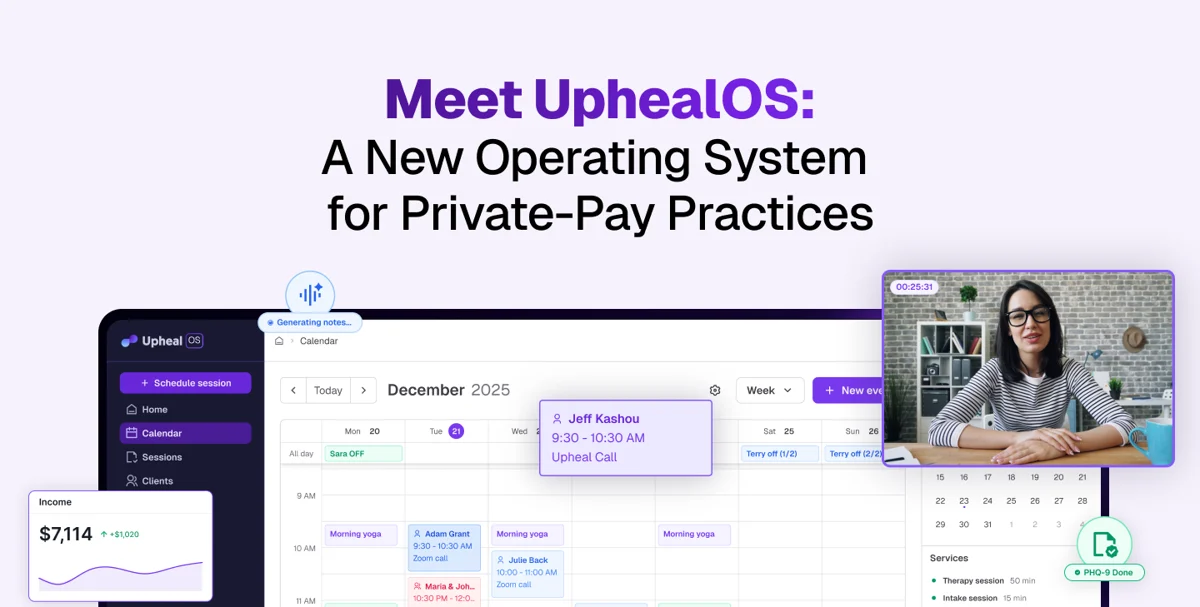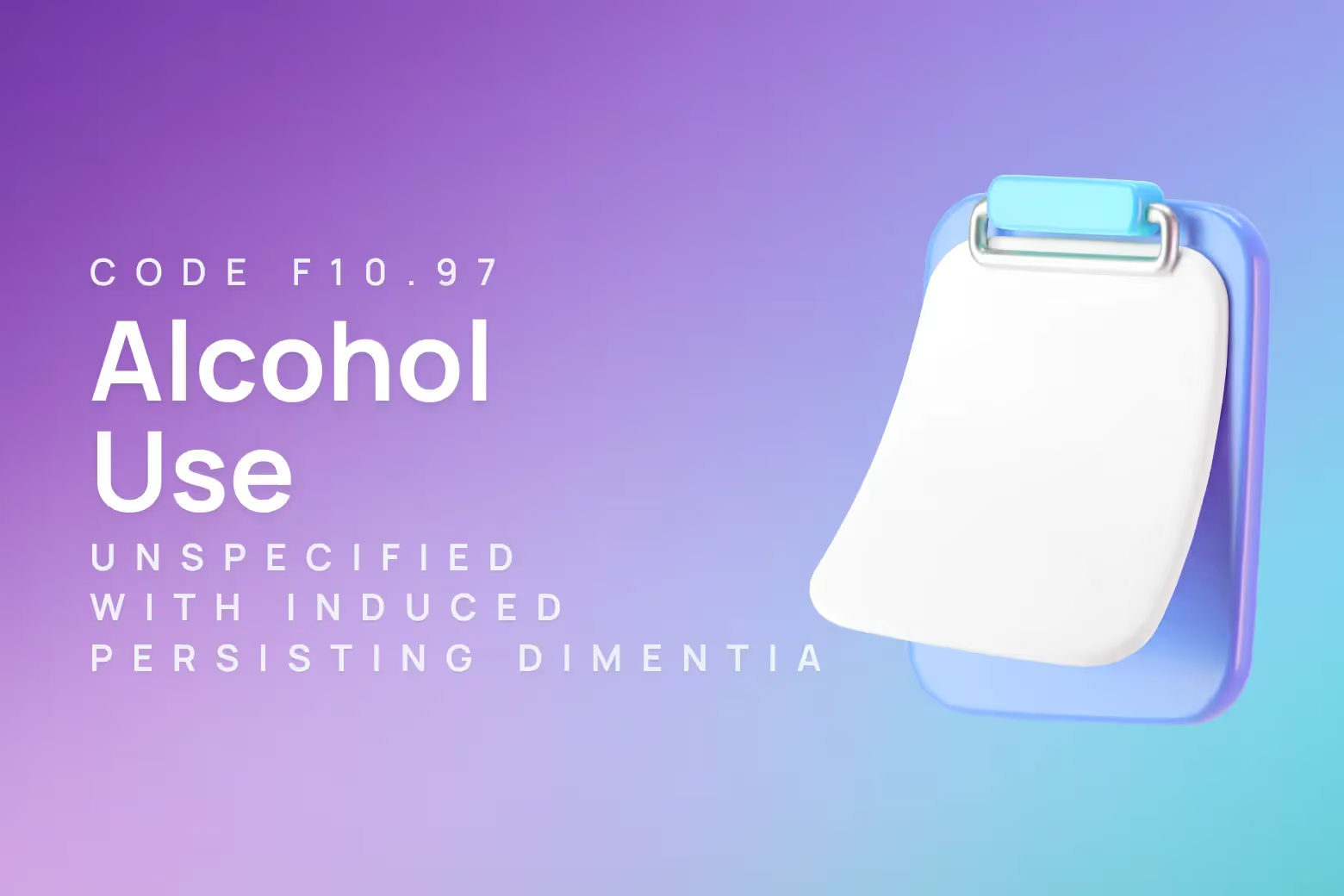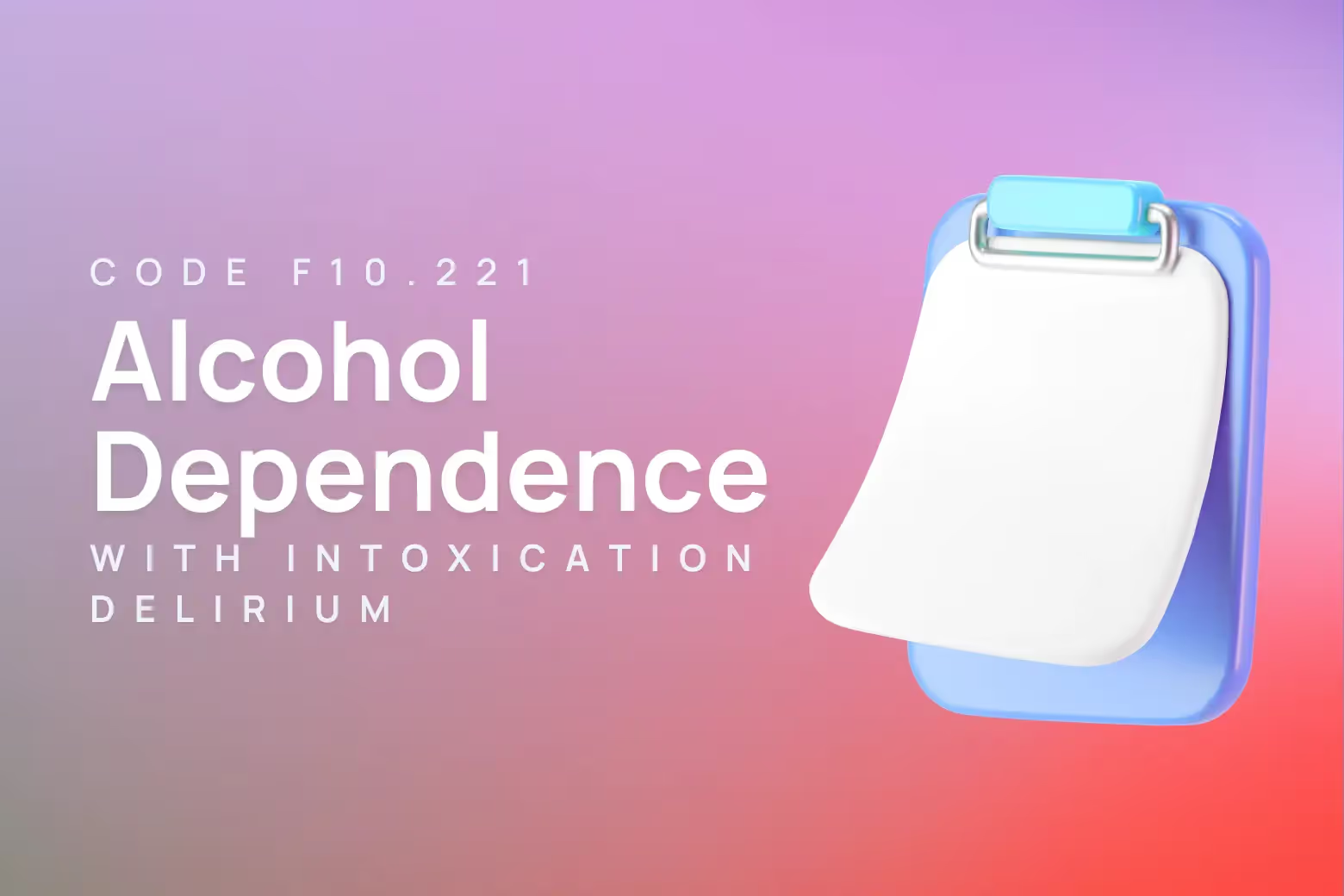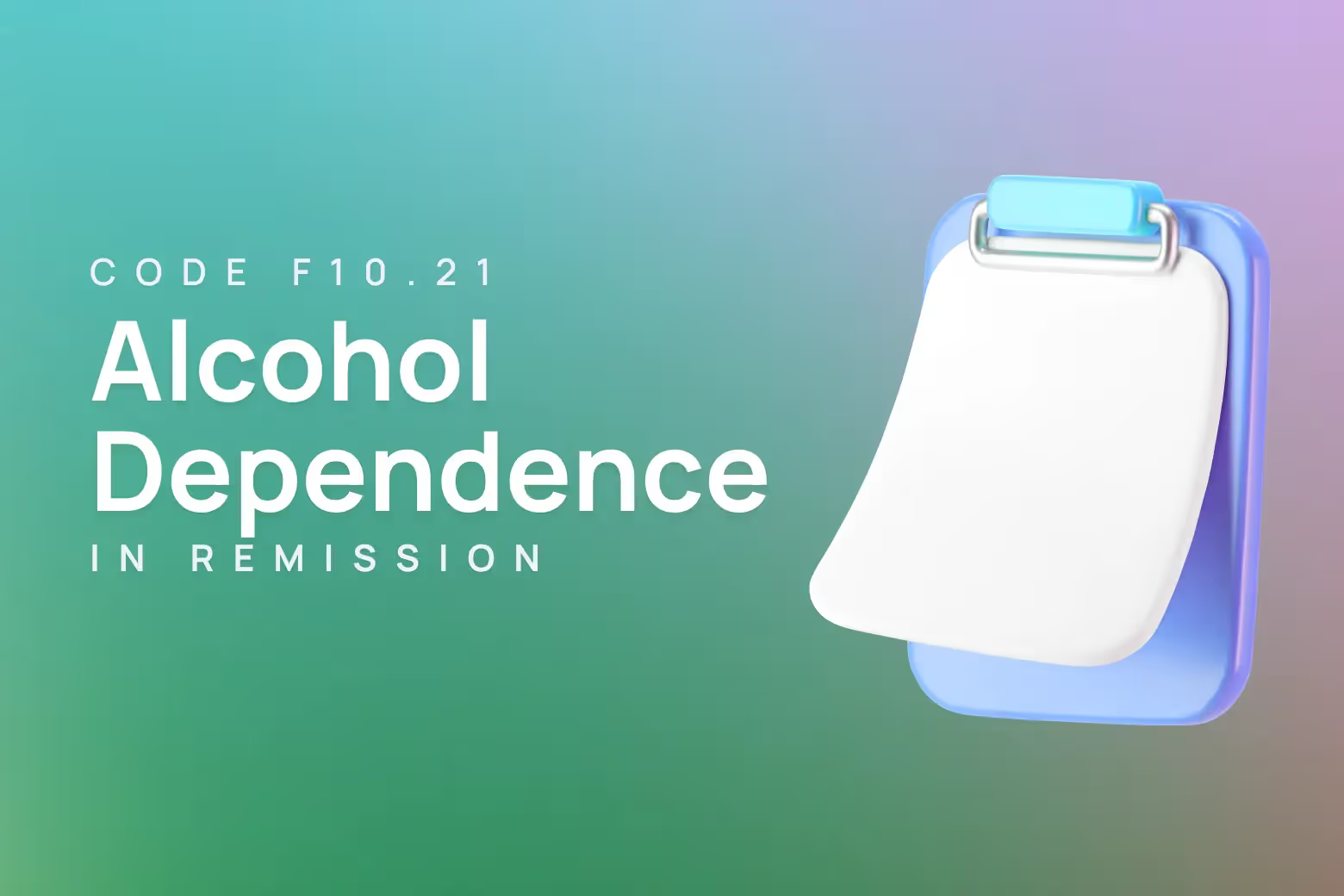ICD-10 code for alcohol use, unspecified with intoxication, unspecified

F10.929 is the ICD-10 code for alcohol use, unspecified with intoxication, unspecified.
This diagnostic code applies when a client presents with clear signs of alcohol intoxication, but there's insufficient information to determine the specific severity of their alcohol use pattern or the exact nature of their intoxication.
Accurate diagnostic coding plays a crucial role in establishing appropriate treatment plans and ensuring proper reimbursement for clinical services.
Key features:
- Used when alcohol intoxication is present but the underlying alcohol use pattern remains unclear
- Represents the most general coding option within the F10.92x family of alcohol intoxication codes
- Applied in emergency settings or initial assessments when comprehensive history isn't available
- Requires documentation of current alcohol intoxication without specifying complications or severity

Diagnostic criteria for alcohol use, unspecified with intoxication (F10.929)
The F10.929 code represents a situation where clinicians can document alcohol intoxication without having complete information about the client's broader alcohol use patterns.
This code becomes particularly relevant in emergency department settings, crisis interventions, or initial assessments where immediate clinical attention takes priority over extensive history-taking.
Alcohol intoxication manifests through several observable signs and symptoms that clinicians can readily identify.
Physical indicators often include the unmistakable smell of alcohol on the breath, facial flushing with visible vascular changes, and coordination difficulties that become apparent during basic motor tasks.
The clinical presentation typically includes behavioral changes such as disinhibition, impaired judgment, and altered emotional regulation.
Cognitive symptoms may encompass confusion, memory difficulties, and impaired concentration that interfere with the person's ability to engage in coherent conversation or follow simple instructions.
Essential diagnostic requirements include:
- Recent alcohol consumption with measurable blood alcohol levels or clear behavioral evidence
- Clinically significant behavioral or psychological changes attributable to alcohol
- Symptoms not better explained by another medical condition or substance use
- Insufficient information to specify underlying alcohol use disorder severity
- Lack of clear evidence for specific intoxication complications like delirium
When to use F10.929 diagnosis code
Proper application of F10.929 requires understanding when this unspecified code provides the most accurate clinical picture compared to more specific alternatives within the alcohol intoxication code family.
The unspecified nature of this code makes it particularly valuable during initial clinical encounters when comprehensive assessment isn't feasible.
Emergency situations often necessitate immediate intervention before detailed substance use histories can be obtained, making F10.929 the appropriate choice when intoxication is evident but background patterns remain unclear.
F10.929 vs F10.920 (Alcohol use, unspecified with intoxication, uncomplicated)
F10.920 specifies uncomplicated intoxication, meaning the client presents with typical intoxication symptoms without additional psychiatric or medical complications.
Choose F10.920 when you can definitively rule out complications like delirium, perceptual disturbances, or significant medical concerns.
F10.929 becomes appropriate when the clinical picture remains unclear or when you cannot confidently exclude potential complications during the initial assessment.
F10.929 vs F10.921 (Alcohol use, unspecified with intoxication, delirium)
F10.921 requires clear evidence of delirium accompanying alcohol intoxication, including altered consciousness, cognitive fluctuations, and attention deficits that develop acutely.
This code demands specific documentation of delirium symptoms beyond simple intoxication effects.
Use F10.929 when cognitive changes are present but don't meet full criteria for delirium, or when the clinical presentation remains ambiguous during initial evaluation.
Related ICD-10 codes
Understanding related codes within the alcohol intoxication family helps ensure accurate diagnostic selection:
- F10.92 - Alcohol use, unspecified with intoxication (parent code)
- F10.920 - Alcohol use, unspecified with intoxication, uncomplicated
- F10.921 - Alcohol use, unspecified with intoxication, delirium
- F10.129 - Mild alcohol use disorder with intoxication, unspecified
- F10.229 - Moderate or severe alcohol use disorder with intoxication, unspecified
Interventions and CPT codes for alcohol use with intoxication
Clinical management of alcohol intoxication requires immediate safety assessment followed by comprehensive evaluation and appropriate intervention planning based on the client's presentation and treatment setting.
Initial assessment and stabilization
Comprehensive psychiatric diagnostic evaluation forms the foundation of effective treatment planning when clients present with alcohol intoxication.
This initial assessment establishes the clinical baseline, evaluates immediate safety concerns, and begins the process of understanding broader substance use patterns that may not be immediately apparent during intoxication.
CPT Code 90791 - Psychiatric diagnostic evaluation covers the comprehensive intake process needed to establish appropriate diagnosis and treatment planning, particularly valuable during initial encounters with intoxicated clients. (CPT codes alcohol abuse.txt)
Individual psychotherapy approaches
Evidence-based psychotherapy interventions prove highly effective for addressing alcohol use concerns once intoxication resolves and clients can meaningfully engage in treatment.
Motivational interviewing techniques help explore ambivalence about change while cognitive-behavioral approaches address the thoughts and behaviors that contribute to problematic alcohol use.
CPT Codes 90832/90834/90837 - Psychotherapy sessions targeting alcohol misuse and relapse prevention represent the core therapeutic interventions. Code selection depends on actual session duration: 90832 for 16-37 minutes, 90834 for 38-52 minutes, and 90837 for 53 minutes or longer.
Family involvement and systemic interventions
Family dynamics often play a significant role in both the development and treatment of alcohol use concerns, making family therapy interventions particularly valuable for comprehensive treatment planning.
CPT Codes 90846/90847 - Family psychotherapy addresses relationship dynamics, codependency patterns, and family-based relapse prevention strategies, with 90846 used when the client isn't present and 90847 when they participate in family sessions.
Screening and brief intervention services
Structured screening combined with brief motivational interventions provides an efficient approach for addressing alcohol use concerns, particularly in healthcare settings where time constraints may limit extensive therapy options.
CPT Codes 99408/99409 - Structured screening with brief intervention services, with 99408 covering 15-30 minute sessions and 99409 for interventions exceeding 30 minutes. These codes work well in primary care or emergency settings where brief but focused interventions can effectively address alcohol use concerns.
Group therapy approaches
Group interventions offer peer support and shared learning opportunities that many clients find particularly beneficial for addressing alcohol use concerns while building recovery-focused social connections.
CPT Code 90853 - Group psychotherapy provides skills training, peer support, and relapse prevention strategies in a cost-effective format that many clients find engaging and supportive.
How Upheal improves F10.929 ICD-10 documentation
Suggesting appropriate ICD-10 codes based on session content
Clinical documentation platforms help behavioral health providers capture the nuanced presentations that distinguish F10.929 from other alcohol-related codes through intelligent analysis of session content.
When clients present with alcohol intoxication but lack clear historical information, documentation tools can identify key clinical indicators that support the unspecified designation while ensuring all relevant symptoms are thoroughly recorded.
This technology assists clinicians in recognizing when insufficient information exists to specify intoxication complications or underlying alcohol use disorder severity, helping ensure diagnostic accuracy during complex clinical presentations.
The platform analyzes session notes to identify patterns that support the F10.929 designation while flagging areas where additional assessment might clarify the clinical picture.
Maintaining HIPAA-compliant records with proper diagnostic coding
Accurate diagnostic coding requires careful attention to documentation standards that protect client privacy while ensuring clinical information remains accessible to treatment teams.
Documentation platforms help maintain this balance by providing structured templates that capture essential diagnostic information while adhering to privacy requirements.
The platform ensures that alcohol intoxication documentation meets clinical standards for F10.929 coding while protecting sensitive information about substance use patterns that clients may not be ready to fully disclose during initial treatment encounters.
Reducing administrative burden so you can focus on client care
Managing complex diagnostic codes like F10.929 while addressing immediate clinical needs can create significant administrative burden that interferes with direct client care.
Clinical documentation tools help reduce this burden by automatically generating appropriate diagnostic suggestions based on session content, allowing clinicians to focus their attention on therapeutic interventions rather than coding complexities.
This support proves particularly valuable when working with clients presenting with alcohol intoxication, as immediate safety and therapeutic concerns rightfully take priority over detailed diagnostic documentation during crisis situations.
Supporting clients with alcohol use, unspecified with intoxication
Clinical work with clients presenting with alcohol intoxication requires balancing immediate safety concerns with longer-term treatment planning that addresses underlying substance use patterns.
The therapeutic relationship often begins during a crisis moment when clients may feel vulnerable, embarrassed, or defensive about their alcohol use, making the initial clinical response particularly important for future engagement.
Effective treatment approaches recognize that clients coded with F10.929 may be in various stages of change regarding their alcohol use, from pre-contemplation through active preparation for modification.
Meeting clients where they are in this process, rather than assuming readiness for abstinence-focused interventions, often produces better engagement and long-term outcomes.
The evidence strongly supports cognitive-behavioral therapy approaches that help clients identify triggers for problematic drinking, develop alternative coping strategies, and build skills for managing high-risk situations.
Motivational interviewing techniques prove particularly valuable for exploring ambivalence about change while building intrinsic motivation for behavior modification.
Treatment planning should address both immediate safety concerns and longer-term recovery goals, recognizing that clients may need time to fully engage with more intensive interventions as the acute intoxication resolves and they can more clearly evaluate their relationship with alcohol.
Upheal's clinical documentation platform helps providers maintain consistent, thorough records throughout this treatment process while reducing time spent on administrative tasks.
The platform's intelligent coding suggestions and session analysis tools allow clinicians to focus more time on direct client care and therapeutic interventions.
Try Upheal for free to experience how professional documentation tools can improve your practice efficiency while supporting better client outcomes.













